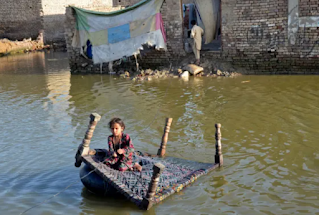Climate Change Forces Millions to Flee in Asia, Lacking Adequate Preparedness
Overview: With the surge in climate-related disasters, the Asian continent is witnessing a growing exodus of people compelled to abandon their homes. The Internal Displacement Monitoring Centre reported a staggering 32.6 million internal displacements linked to disasters in 2022, marking a 41% increase from the annual average of the past decade. This surpassed the 28.3 million individuals displaced by conflict and violence during the same year. The situation is particularly critical in Asia, with four of the top five countries in 2022 facing new internal displacements due to disasters belonging to this region.
Key Points:
Record Internal Displacements: The internal displacement figures associated with climate disasters reached an unprecedented level in 2022, presenting a pressing concern. The leading countries in terms of new internal displacements were Pakistan (8.2 million), the Philippines (5.5 million), and China (3.6 million).
Projected Escalation: A 2021 World Bank report warned that climate change might force around 216 million people across six regions to relocate within their countries by 2050. However, experts argue that these estimates could be conservative, underestimating the actual impact.
South Asia Vulnerability: South Asia, with its dense populations and susceptibility to climate change effects, is poised to witness the most significant displacement. Bangladesh, Pakistan, and Afghanistan are identified as the countries most likely to be severely affected.
Economic Implications: Climate-induced internal displacement poses severe economic risks for affected countries. The World Economic Forum indicates that 10% to 18% of South Asia's GDP is at risk due to climate disasters, significantly higher than North America and Europe.
Cross-Border Migration: While internal displacement is more common, the intensification of climate change effects could lead to gradual cross-border movements. As an example, Australia signed a migration deal with Tuvalu, offering permanent residency to citizens affected by climate change.
Disguised Migration Flows: Climate-induced migration may manifest as traditional migration flows, such as labor migration. For instance, Bangladeshi migrant workers moving overseas could be driven by climate change impacts on crop production, with little research available on their motivations.
Protective Responses: Governments are urged to reassess migration channels to safeguard human rights in the context of climate-induced displacement. Protective measures should go beyond visas, offering comprehensive support for integration and cultural adaptation.
Global Cooperation: Addressing climate displacement requires a three-fold approach involving relief and rehabilitation, adaptation to climate change, and mitigation through decarbonization. A collaborative facility, pooling resources across countries, is proposed to ensure timely financial assistance during crises.
Role of Developed Countries: Industrialized nations, having contributed more to climate change, are encouraged to provide migration pathways, work opportunities, and financial aid to help affected countries adapt. The $100 billion per year commitment by developed countries needs to be upheld and expanded.
Urgent Action: While discussions on climate change persist, millions of climate migrants remain unnoticed and voiceless. Urgent action, a shift in public opinion, and political pressure are deemed essential to address the plight of these forgotten casualties of climate change.
The escalating climate-induced displacement crisis demands immediate attention, collaboration, and sustainable strategies to mitigate its impact on affected populations.
#ClimateChange, #ClimateDisplacement, #AsiaClimateCrisis, #InternalDisplacement, #MigrationChallenges, #ClimateAction, #GlobalCooperation, #HumanRights

